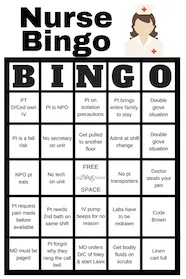
Many factors likely contribute to the poor morale on some nursing units. For example, if the house supervisor decided to cut the aide or extra nurse who was on shift and the other nurses are forced to pick up more patients. Or it could be a holiday and many nurses are forced to work rather than spend time with their families. Perhaps there is poor management and some employees get special treatment while others are forced into working unfair shifts.
There is no shortage to the catalyst for any particular nurses foul mood. But what is the reason for the overall poor morale in some nursing units?
In my experience the poor morale in nursing units comes from negativity feeding on negativity.
Being a nurse is hard work. But despite the fact that the job can be stressful, nurses often shoot themselves in the foot and make their lives much harder than it has to be. Workloads often overwhelm a nurse’s sense of decency and compassion for our colleagues and we can really be asses to each other.
In addition to the hard work, stressful seemingly never-ending shifts, and almost always having to work Holidays, nurses are also forced to deal with each other on a routine basis. And let’s just be honest, if you’re pushing yourself to the limit every day (like many nurses) then chances are that you probably aren’t going to be Little Miss Sunshine every day of the week. If you add these invenvitable offs days together you might have a nursing unit where everyone is feeding off each other’s misery. Even though one nurse may not be having a bad day, his/her mood is adversely effected by the nurses they with with.
Being in a bad mood can cause nurses to make all sort of poor choices.Simple polite gestures are often forgotten. Compassion and sensitivity for coworkers go by the wayside (especially if you’ve got 6 sick patient’s and they need all the compassion you can muster). A nurse may becoming increasingly catty and amused at the misery of others. After all, misery does love it’s company.
Because there is no real downtime for nurses, this vicious cycle of misery and negativity just repeats itself. And until there is some sort of intervention for a motivated staff member the poor morale will continue to make a work environment toxic.
We really shouldn’t poop where we sleep.
Find out how nurses can improve morale and avoid burnout.
Download Nurse Bingo Today!

Liven up any shift with a fun game of bingo. See who can fill a row first!
Fill a whole card and lose grip with reality.
Your privacy is protected. We will never spam you.



![15 people who had the biggest impact on nursing [infographic] 3 15 People Who Had the Biggest Impact on Nursing [Infographic]](https://thenerdynurse.com/wp-content/uploads/2013/04/great-nurses.jpg.webp)

Leave a message…
I agree. Unfortunately, when the most important things for your nurse manager is to attend a teleconference every day during report time, it is wrong. Management does need to be seen as well as heard, and upper management needs a clue about that.
I most respect the managers I have worked with who see us struggle and jump right in to help, whether it’s answering call lights, phones, or toileting patients.
I agree with all that you have said, but I also find that leadership or more accurately the lack of it has a lot to do with units with chronically low moral. Too many Nurse managers lead by remote control from a desk in an office, when they are not doing the rounds of meetings, that is. The most important lesson I ever learned about leadership comes straight from the USAF manual for officers: “Leadership is by force of personal example.”